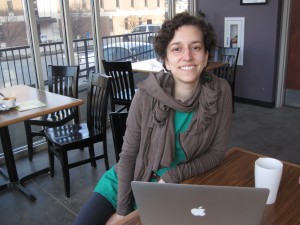Day never dawns; it’s always dawning,
and in this dim obscurity
behind our yellow curtain
I sit waiting for your silhouette below.
Is the moon somehow involved
in this high tide of dirty cobblestones,
or do my overtired eyes invent
a continuous rise and fall?
I leaned over the mash tun once
to inhale the promising odor of decay.
So I wait, but there will be no dawn.
Soha nincs hajnal, mindig cask hajnalodik,
és ezen a derengésen át,
akár, ha sárga függönyünk alatt ülnék,
figyelem, hogy felbukkansz-e odalent.
Vajon a holdnak van köze a mocskos
kockakövek súlyos árapályához is,
vagy cask az én szemem fáradt már annyira,
hogy folyton torlódást, ereszkedést lát?
Mint egykor, a cefréshordó fölé hajolva,
ahogy mélyen beszívtam az érés bíztató illatát,
éppen így várok most. Mégsem less többé hajnal.
•
 Genevieve Arlie, after years of bicoastal living, decided to split the difference and move to Iowa, where she studies literary translation.
Genevieve Arlie, after years of bicoastal living, decided to split the difference and move to Iowa, where she studies literary translation.
Dénes Krusovszky is a Hungarian poet, editor, and translator. He has has published three volumes of poetry: Az összes nevem [All My Names] (2006), Elromlani milyen [How It Feels to Go Wrong] (2009), and A felesleges part [Indeed Shore] (2011), for which he won the József Attila Prize. He edits the literary quarterly Ex Symposion and the JAK World Literature Series.
